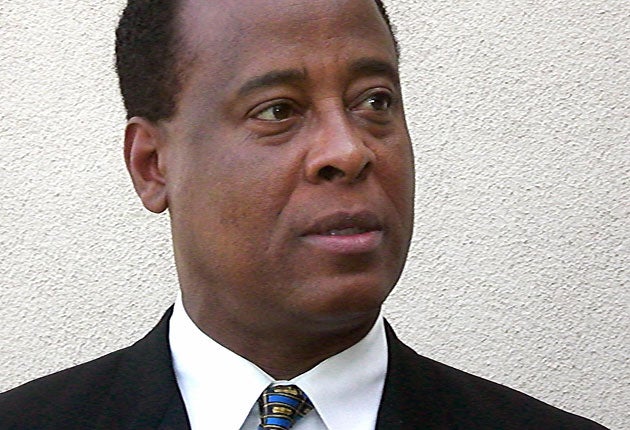Michael Jackson doctor 'facing manslaughter charge'

Your support helps us to tell the story
From reproductive rights to climate change to Big Tech, The Independent is on the ground when the story is developing. Whether it's investigating the financials of Elon Musk's pro-Trump PAC or producing our latest documentary, 'The A Word', which shines a light on the American women fighting for reproductive rights, we know how important it is to parse out the facts from the messaging.
At such a critical moment in US history, we need reporters on the ground. Your donation allows us to keep sending journalists to speak to both sides of the story.
The Independent is trusted by Americans across the entire political spectrum. And unlike many other quality news outlets, we choose not to lock Americans out of our reporting and analysis with paywalls. We believe quality journalism should be available to everyone, paid for by those who can afford it.
Your support makes all the difference.Prosecutors investigating Michael Jackson's death plan to charge the singer's doctor with involuntary manslaughter rather than seek a closed-door grand jury indictment, a source said.
The strategy shift would give an eager public an earlier look at evidence.
While there is no public timetable for charges to be filed against Dr Conrad Murray, there are strong indications the move is imminent.
Dr Murray and lawyer Edward Chernoff have travelled to Los Angeles from Houston, Texas, where Dr Murray practices, and the lawyer said his client was prepared to turn himself in.
"If they tell him to surrender in 10 minutes, he'll go surrender," said Mr Chernoff, who spent several hours meeting other members of Dr Murray's defence team yesterday.
"He's never hidden, he's always been available."
David Walgren, the deputy Los Angeles County district attorney handling the case, declined to comment.
Pop megastar Jackson, 50, hired Dr Murray to be his personal physician as he prepared for a strenuous series of comeback performances in London.
His shock death on June 25 in Los Angeles came after Dr Murray, tending to Jackson in the star's rented mansion, administered the powerful anaesthetic propofol and two other sedatives to get the chronic insomniac to sleep, according to the Los Angeles County coroner's office, which ruled the death a homicide.
Propofol is only supposed to be administered by an anaesthesia professional in a medical setting. The patient requires constant monitoring because the drug depresses breathing and heart rate while also lowering blood pressure, a potentially deadly combination.
Dr Murray has maintained from the outset that nothing he gave the singer should have killed him.
It was not illegal for him to administer propofol to Jackson, though whether he followed proper procedures while Jackson was under the influence of the drugs is a key part of the case.
To bring a manslaughter charge, prosecutors must show there was a reckless action that created a risk of death or great bodily injury. If a doctor is aware of the risk, there might also be an issue of whether the patient knew that risk and decided to take it.
Los Angeles Police Department investigators spent months gathering evidence, with detectives talking to numerous medical experts to determine whether Dr Murray's behaviour, which included talking on his mobile phone and leaving Jackson's bedside, fell outside the bounds of reasonable medical practice.
Last month, a law enforcement official said prosecutors had decided to seek a grand jury indictment on an involuntary manslaughter charge.
Yesterday, a second law enforcement official said prosecutors were sticking with the charge, but planned to file a criminal complaint to avoid the appearance of secrecy in the closely-watched case.
Grand jury proceedings are secret. A panel meets, hears evidence and then decides whether to return an indictment.
A criminal complaint, however, is a prelude to a public hearing where a judge would consider evidence from witnesses to decide if there is probable cause to bring a case to trial.
Mark Geragos, a private criminal defence lawyer who has represented a string of high-profile clients, including Jackson, said the decision suggested prosecutors were unsure they could persuade a grand jury that Dr Murray was criminally liable for Jackson's death.
"This may be one of those rare cases where a grand jury of citizens is not ready to attach criminal liability to the doctor," he said. "They may feel they are better off in front of a judge."
But Harland Braun, a celebrity defence lawyer who has also represented doctors in court, disagreed, saying the move showed prosecutors were confident their evidence and witnesses could withstand cross-examination and public scrutiny.
"It's really a test run on a case," he said. "Both sides get to know what the strengths and weaknesses of the case are."
Join our commenting forum
Join thought-provoking conversations, follow other Independent readers and see their replies
Comments